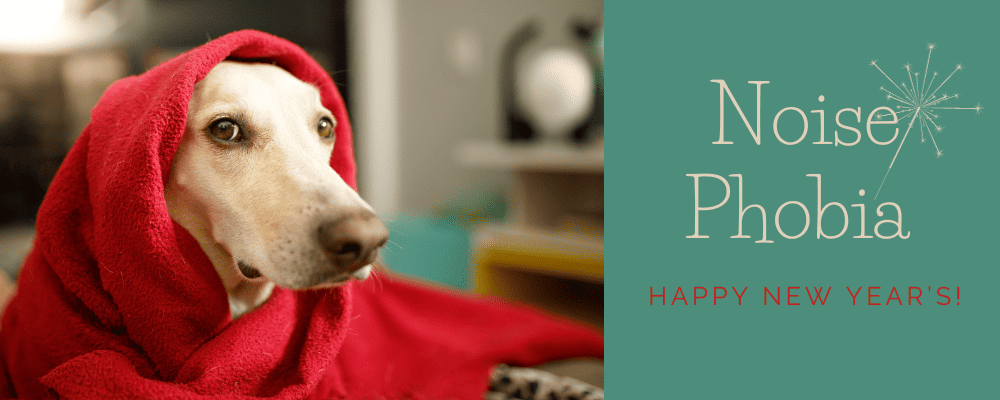While New Year’s Eve celebrations are fun for us humans, our furry companions can easily become scared during the festivities. Many pets become scared at the sound of fireworks or noisy music, and you can risk your pet trying to run away – in fact many shelters see a greater number of lost dogs following the holidays.
Noise phobia is an excessive fear of a sound that results in the dog attempting to avoid or escape from the sound. It’s an irrational, intense and persistent fear response that can develop at any age and in any dog breed.
When afraid, a dog’s normal instinctive behavior is to try to escape from the noise, or seek shelter to avoid danger. But things can go awry when dogs overreact to sounds that don’t represent danger.
Characteristic behavior can include but may not be limited to hiding, urinating, defecating, chewing, drooling, panting, pacing, trembling, shaking, and barking. A fearful dog might seek out his human family, try to escape the noise by jumping through windows or chewing through walls, or run away.
We don’t know why some dogs sleep through loud noises and others panic. It is most likely part genetic and part learned behavior. The most common causes of noise phobia are fireworks and thunderstorms, but dogs may develop a fear of any sound no matter how inconsequential. Even a squeaky door being opened, someone using a fly swatter or a fan being turned on can provoke a reaction from a noise-phobic dog. And, the more exposure a dog has to a frightening noise, the more intense his phobic response is likely to become.
With New Year’s Eve quickly approaching, you’ll want to consider your pet’s noise phobia when you make your plans. Here are some tips to help keep your dog calm, making for an easier holiday for both of you. Some of these apply to thunder phobias as well.
Follow these tips for a safe and fun New Year’s Eve for you and your pets:
- Exercise pets during the day – for dogs, take them on a long walk or run. For cats, play with them for up to a half-hour or more. If they are tired, pets are more likely to nap or rest through the festivities.
- Keep dogs and cats indoors – if you must let the dog out for a bathroom break, monitor them closely by keeping them on a leash. Make sure the collar is fitted and there is no chance of escape if they become frightened by the sounds of fireworks. It is best to not let your cats out at all.
- Keep dogs and cats in a familiar, cozy area (bedroom, for example) with food, water, toys, and bedding. Try playing soothing music in the room to drown out the sound of fireworks. If you have both dogs and cats, you may want to separate them in different rooms.
- Make sure if your pets interact with party guests that everyone knows not to feed your pets food or alcohol. This may seem self-explanatory, but some people may not be aware of the dangers of such behavior.
- Use of supplements or medications to keep your pet calm- There are a variety of herbal supplements and prescription medications that can be used to relieve anxiety or sedate your pet. If you know that fireworks or other noises cause stress for your pet, don’t make them suffer. Call us today so we can help provide a solution.
All of us from Animal Medical Clinic wish you a Happy New Year!
